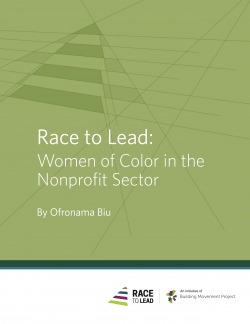Race to Lead: Women of Color in the Nonprofit Sector
Race to Lead: Women of Color in the Nonprofit Sector can be found at racetolead.org/women-of-color. BMP’s research has already emphasized the need to address deeply embedded biases and systemic barriers that negatively impact the career advancement and experiences of people of color working in the nonprofit sector. By examining the impact of both race and gender on survey respondents, this report adds important nuance to the conclusions drawn from the other reports in the Race to Lead series.
Some key findings include:
- Racial and gender biases create barriers to advancement for women of color. Women of color report being passed over for new jobs or promotions in favor of others—including men of color, white women, and white men—with comparable or even lower credentials.
- Education and training do not provide equity. Women of color with the advanced education were more likely than men of color, white men or white women to work in administrative roles and the least likely to hold senior leadership positions. Women of color also are paid less compared to men of color and white men and more frequently report frustrations with inadequate salaries.
- The social landscape of organizations is fraught for women of color. Women of color who reported that their race and/or gender have been a barrier to their advancement indicated that they were sometimes left out or ignored and sometimes hyper-visible under intense scrutiny, with both conditions creating burdens.
- The report also includes a section detailing key themes from survey write-in responses by women of color and from focus groups and interviews conducted with Asian/Pacific Islander, Black, Latinx, Native American, and transgender women of color.
Some solutions BMP recommends include:
- Leverage the power of philanthropy. Funders should examine their own grant-making practices to support more organizations led by women of color. Funders should also encourage their grantees to embark on a race and gender equity journey by asking about the racial composition of staff and boards of organizations in grant proposals and demonstrating to organizations that the diversity information informs their strategy and funding decisions.
- Advocate for enforcement of anti-discrimination laws. The nonprofit sector should advocate for the Equal Employment Opportunity Commission to receive more appropriations to investigate charges of discrimination—even if this means uncomfortably turning the lens on itself.
- Address internal biases. Organizations should address both conscious and so-called “unconscious” biases that affect the mentoring, feedback, evaluations and overall treatment of women of color. These steps toward equity cannot be limited to anti-bias training, which is necessary but insufficient. Nonprofit organizations also need robust and equitable HR policies and systems that will set an expectation that racism, sexism, anti-trans bias, etc. will not be tolerated, and also enforce real consequences for staff who violate those expectations.
- Pay women of color fairly and create transparency around pay scales to expose discrimination. Organizations should ensure transparency regarding pay scales to ensure that individuals with similar credentials and experiences are similarly compensated.
- Create peer support affinity groups for women of color. Peer support does not take place by happenstance: it must be intentionally structured and supported. Peer support should be understood as a supplement to—not a substitute for—in-organization mentoring opportunities provided by supervisors and other senior staff, and increased grant investments in women of color-led organizations.
Learn more about the survey’s findings and our recommendations by downloading and sharing the full report and executive summary.

